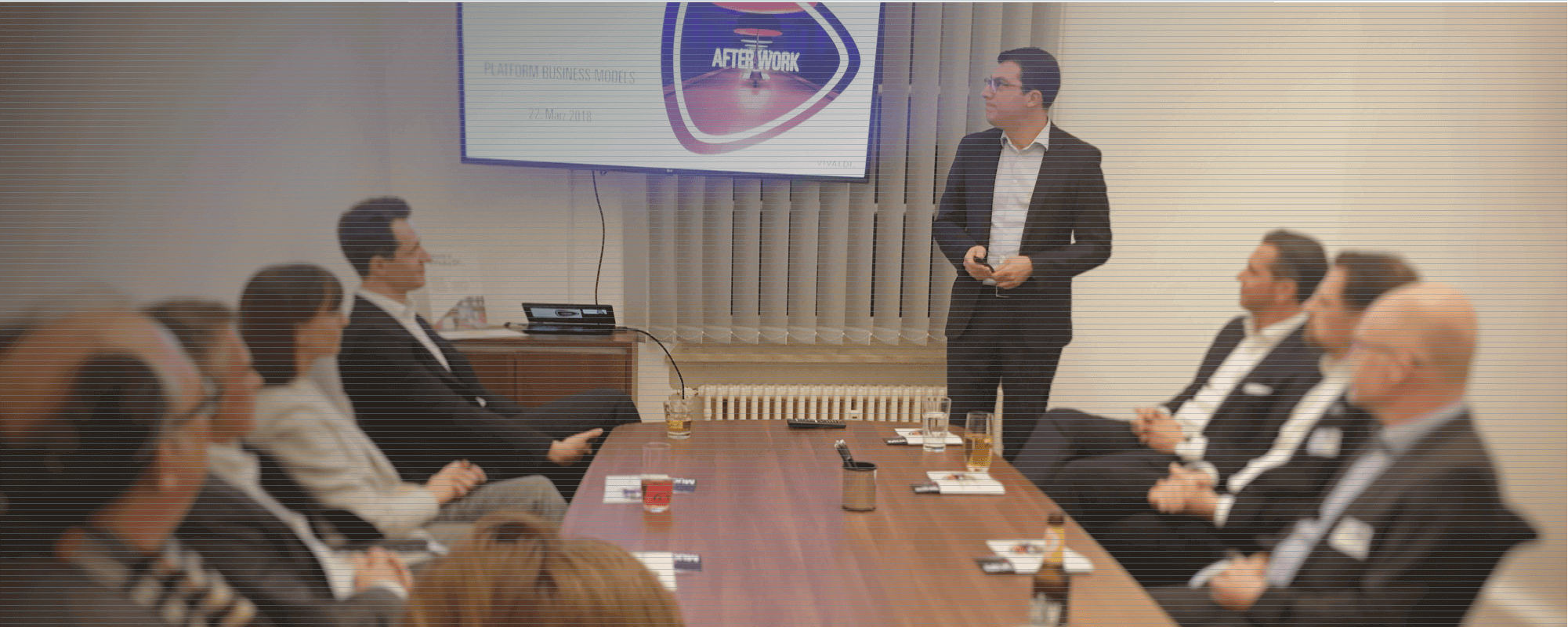At Vivaldi, we’re excited about the opportunities that a platform strategy approach offers and have put together an introductory workshop series to get our network thinking about how their companies can unlock the potential of platforms.
We kicked off our first Europe-based workshop in our office in Munich. It was an inspiring evening with marketing and strategy executives from the likes of AOK, BayWa, Bausparkasse Schwäbisch Hall, GE, Telefonica, Thüga, TÜV Süd and Welbilt to discuss opportunities in the platform economy.
Vivaldi’s Senior Partner, Dr. Markus Zinnbauer introduced participants to the world of platform business models, they were given the opportunity to add their thoughts and expertise on the topic. Our subsequent work session revealed several interesting approaches and potentials for platform business models for two specific industries: healthcare and energy. See below for three key insights we gained from the evening:
1) Obstacles and Challenges
One of the biggest challenges for companies is innovative platforms’ threat to the current business model. In most cases, platforms are disruptive and cannot be implemented obstacle-free in an organization. Sourcing them out into a digital or innovation unit is a risky solution considering the danger of creating silos.
Furthermore, the scope of action for innovative business models is perceived to be limited. New platforms and business models do not meet the high-performance dependency and the strict focus on EBIT results. The innovative power of companies is often what is lacking. In contrast, players like Amazon never fall into the EBIT trap. They create new business models with courage, resilience and resource power, even if they only pay off in the long-run.
It is clear that a change in perspective is more than necessary. When establishing an innovative business model, the focus should not only be short-term profits. It is equally important to look at losses, which can be avoided within the current business model.
2) Data as a New Revenue Stream
Digital technologies influence a company’s offering. In the long-run, products and services will only make up one part of a company’s success. Strategically collecting and using data will be a key factor in many new business models. It is essential to understand where valuable data can be collected and how to use it to create new value – for customers as a relevant and personalized offering, and for the company itself with regards to increasing profitability.
Data is becoming a more and more strategic and a valuable asset with great potential. To take advantage of this potential, it is necessary to have the right set of data competencies. A few years ago this meant collecting data, whereas today the core task is gaining relevant insights and monetizing them.
3) Incumbents vs. Disruptors
With marketing leaders across different industries, our discussion showed that an industry often consists of a mix of established companies (incumbents) and new market players (disruptors) which drive platform businesses. Be aware that, in many cases, the competitive advantages of established players – financial power and resource strength – are becoming obsolete. This is due to the growing venture capital culture with which new players can establish comparable financial strength. Combined with not being afraid of taking risks and a lower EBIT focus, they are much agiler and can become a relevant threat to incumbents.
Potential competitors should be converted into partners early on. Collaborating with agile, new players offers an opportunity for established companies to benefit from synergies, new business models, and monetary rewards.

We want to thank everybody for a successful evening with exciting discussions and a lively exchange of knowledge on platform business models. We look forward to our upcoming events in Düsseldorf, Hamburg, Zurich, and London – enquire about our next event by emailing hello@vivaldigroup.
